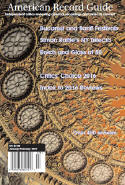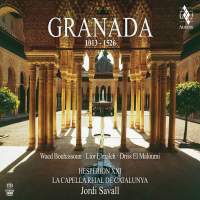Texte paru dans: / Appeared in: |
|
|
Outil de traduction ~ (Très approximatif) |
|
|
Reviewer: John
W. Barker
This is the latest of Savall’s
“CD books”, even if it is cast in a standard CD-size album. Like so many of
its predecessors, it explores multi and intercultural patterns in the music
of the past. This one also is from a public concert in June 2013. It uses the history of the city of Granada (with its fabulous palace of the Alhambra) as its platform. The program follows that history in a series of seven subdivisions, period by period. The scope is somewhat broader than the dates in the album title suggest: there were already five centuries of Muslim rule over the Iberian peninsula before the regimes that ruled from Granada were established, so the program has a fuller context that allows attention to Savall’s interest in how the cultures of Christians, Jews, and Muslims “coexisted” for centuries.
Of the 20 tracks with musical
selections, 2 are in Hebrew, 2 are in Ladino, 4 are in Arabic, 2 are in
Latin, 1 in Galician, 4 in Castilian (Spanish); and 5 are instrumental. Only
three actual composers (Alfonso El Sabio, Carlo Verardi, and Juan del Encina)
can be credited. A number of the tracks are simply improvisations in
traditional styles.
Each selection is pegged to an
event in Granada’s history. With two or three exceptions, the musical
selections are not explicitly connected with the events, but serve more as
scene-setting “music-in-the-time-of” examples.
Catalan, German, and Italian There is also a number of color illustrations. This seems to me one of the better of Savall’s thematic CD books. It is the strongest of his explorations of cultural interaction, without the preachiness that has burdened its predecessors. And, despite some glitches, it offers some very unusual, satisfying listening. | |
|
|
|
|
Cliquez l'un ou l'autre
bouton pour découvrir bien d'autres critiques de CD |
|




